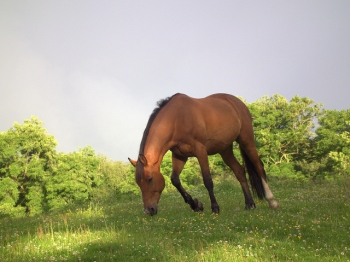How to Win the Battle against Equine Parasites

It is no real surprise that internal parasites have a reputation of being silent killers. In the main they will go about their business undetected, often until it is too late. Their aim of course is to cause extensive damage to their hosts, very often by stealing the very nutrients that your horse needs.
Lesser infections will often result in the parasites lowering the horse’s resistance to other infections. The owner can then expect a degree of gastrointestinal issues. At their worst, these tiny parasites will go on to disable the animal in question with heavy bouts of colic and intestinal ruptures that will ultimately lead to death.
Important and valuable processes will need to be undertaken to help prevent these issues developing. The effective management and control of parasites is an absolute must, if you are to stand any chance in keeping your horse in good condition.
Parasite Life Cycles
When it comes to equine parasites, it is usual to for the larvae or eggs to find their way to the horses manure. This is then deposited onto the ground. When the horse grazes they will then swallow the larvae. Once inside the gastrointestinal system the juvenile larvae will then develop into egg laying adults. Some species of parasites will travel to other areas of the horse’s body, carrying on their infectious work. They then return back to the gastrointestinal system to lay more eggs.
Frequent Worming
To combat the effects of these intruders the owner must carry out frequent worming of their animal. An excellent product to use comes in the form of Equest oral gel. This particular product is recognised as one of the best horse wormers for sale in the UK.
Equest is particularly effective in the control of both immature and adult roundworms. Dispensed as a gel, the active ingredient is Moxidectin. A tube containing 12 grams of the gel is normally sufficient to treat a 575 kg animal.
Aside from wormers for horses it is also sensible to instigate other process and controls. The best of these will include:
• Removing manure droppings in the pastures twice each week
• Reduce the number of horses per acre to a minimum
• Instigate the use of a feeder for hay, as opposed to feeding from the ground
• Rotate the use of cheap equine wormers with more expensive types
Instigate Without Delay
By following some or all of the above steps you will be giving your horses a much better chance of avoiding these dangerous parasites.
An effective plan should be discussed with your vet. Once agreed upon, this plan should then be instigated without delay. Once the parasite control program is underway you will see a market improvement in the performance, comfort and overall well-being of your animal.
Leaving parasites untreated is a recipe for disaster, especially in the case of horses. A product like Equest can go a long way into the successful treatment of roundworms and other deadly parasites and if you need to know more contact your supplier online or your local vet.
Debbie Reade is a frequent contributor of articles for Wormers.co.uk and has written on many subjects pertaining to all animal needs including cats and dogs but mainly on the subject of Equine health.
